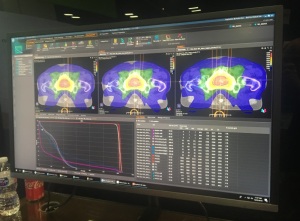por
John R. Fischer, Senior Reporter | October 25, 2018

RayStation 8B will offer machine learning
applications for automated treatment
planning and organ segmentation
RaySearch Laboratories AB unveiled two machine learning applications this weekend at the 2018 ASTRO Annual meeting in San Antonio, Texas, which will be available on the next generation RayStation 8B.
The applications will allow for automated treatment planning and organ segmentation.
“When you did a plan before, it could take anywhere from four to twelve hours. With automated treatment planning on RayStation 8B, you just click one button and you get a plan in two minutes,” Mats Holmström, a machine learning engineer for RaySearch, told HCB News. “You can also perform organ segmentation in less than one minute, and even do so more or less when the patient is lying on the bed.”



Ad Statistics
Times Displayed: 43258
Times Visited: 1186 Ampronix, a Top Master Distributor for Sony Medical, provides Sales, Service & Exchanges for Sony Surgical Displays, Printers, & More. Rely on Us for Expert Support Tailored to Your Needs. Email info@ampronix.com or Call 949-273-8000 for Premier Pricing.
With the automated treatment plan application, users can select the name of the plan they would like and set the default for the machine the patient is treated on, as well as multiple techniques they plan to utilize. They can produce multiple plans if they wish, with the machine providing insight as to what is possible and what is not possible.
The application can also be applied for use in proton therapy planning, although proton plans may not be robust enough yet and will be further explored in the development of RayStation 9.
Holmström says the use of the applications tie in with RaySearch’s objective to determine what is working and what is not working in radiation oncology, using the power of machine learning.
“The main driver for why machine learning has grown so fast over the last few years is because the computational power is much better now,” he said. “We are able to develop algorithms to be able to train more data. Before, the computer was not fast enough and we didn’t understand how to train the data. Now we have the power and computer aspects, and we can train.”
RaySearch plans to investigate other potential machine learning capabilities to incorporate into future iterations of the RayStation platform, including tumor segmentation.
Distribution of the RayStation 8B platform in the U.S. is expected to begin sometime in 2019 following FDA clearance.

